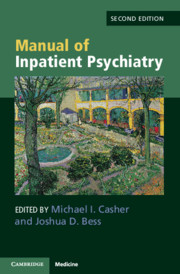Book contents
- Manual of Inpatient Psychiatry
- Manual of Inpatient Psychiatry
- Copyright page
- Contents
- Contributors
- Preface to the Second Edition
- Foreword: American Inpatient Psychiatry in Historical Perspective
- Chapter 1 The Inpatient with Schizophrenia
- Chapter 2 The Inpatient with Depression
- Chapter 3 The Inpatient with Mania
- Chapter 4 The Inpatient with Borderline Personality Disorder
- Chapter 5 The Inpatient with Dementia
- Chapter 6 The Inpatient with Traumatic Brain Injury
- Chapter 7 The Inpatient with Dual Diagnosis (Co-Occurring Disorder)
- Chapter 8 The Young Adult on the Inpatient Unit
- Chapter 9 Clinical Documentation on the Inpatient Unit
- Index
- References
Chapter 5 - The Inpatient with Dementia
Published online by Cambridge University Press: 05 March 2020
- Manual of Inpatient Psychiatry
- Manual of Inpatient Psychiatry
- Copyright page
- Contents
- Contributors
- Preface to the Second Edition
- Foreword: American Inpatient Psychiatry in Historical Perspective
- Chapter 1 The Inpatient with Schizophrenia
- Chapter 2 The Inpatient with Depression
- Chapter 3 The Inpatient with Mania
- Chapter 4 The Inpatient with Borderline Personality Disorder
- Chapter 5 The Inpatient with Dementia
- Chapter 6 The Inpatient with Traumatic Brain Injury
- Chapter 7 The Inpatient with Dual Diagnosis (Co-Occurring Disorder)
- Chapter 8 The Young Adult on the Inpatient Unit
- Chapter 9 Clinical Documentation on the Inpatient Unit
- Index
- References
Summary
Dementia, or Major Neurocognitive Disorder per the DSM-V, is an umbrella term used to describe a group of clinical syndromes defined by deterioration in intellectual functioning. In order to diagnose dementia, an individual must have a significant decline in cognitive functioning from baseline, with deficits in at least one cognitive domain. Common domains affected include reasoning ability, visual–spatial processing, mathematical ability, language, and executive function. As dementia progresses, individuals have increasing difficulties with the “4 As”: amnesia (inability to use or retain memory), aphasia (difficulty with receptive and/or expressive language), apraxia (loss of ability to perform previously learned tasks) and agnosia (misidentification of familiar people, objects, or places). In its later stages, basic functioning ceases and individuals become totally dependent on others for care.
The clinical syndrome of dementia can be caused by a number of different underlying disease processes, varying from nutritional deficiencies to neurodegenerative disorders.
- Type
- Chapter
- Information
- Manual of Inpatient Psychiatry , pp. 106 - 125Publisher: Cambridge University PressPrint publication year: 2020



